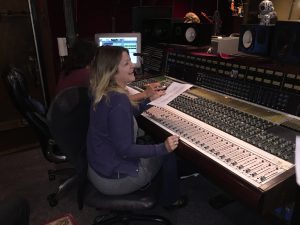By Leslie Buttonow

Just around the corner from California’s famous Santa Monica Promenade, a who’s who of musicians has been setting the music world on fire. For more than forty years, rock, pop and country music royalty have come to 4th Street Recording, as it’s currently known, to create their hit records. 4th Street Recording is a full service studio with amenities that range far beyond tracking, such as special instrument and equipment rentals, session player arrangements and lodging reservation assistance. In fact, many clients have called it their home away from home.
The studio also boasts a world-class clientele with an equipment list to match. Notable female artists who have worked with them include Lisa Loeb, Ke$ha, Fiona Apple, Macy Gray, Shelby Lynne and many others.
Owner Kathleen Wirt shares with us a day in the life of a busy studio owner, some secrets to longevity in the business, fond memories, and advice for those starting out in their careers.
To learn more, head over to 4thstreetrecording.com.
WiMN: You have a rich and diverse professional background with experience as a writer, actress, non-profit coordinator, and set decorator, among many other roles. How did you gravitate toward running and ultimately owning a recording studio?
KW: Well, I did almost all of those jobs to make money while we were getting the studio off the ground. I worked three to four jobs at a time for about five years. Our projects were usually two weeks to three months long, so I did the administrative work and still had time to read scripts and proofread legal depositions in my studio office. I could leave for an audition or an acting or decorating job, and then go wait tables in the evening, returning to listen to mixes and drink with the band.
How did I gravitate toward running/owning a studio? I married a punk rock singer who became a really gifted producer that gave me the studio nineteen years ago in our very friendly divorce.
WiMN: Unlike studio engineers, who spend most of their time tracking, mixing or mastering music, studio managers and owners play a different and more diverse role. Can you share with our readers some of your responsibilities? How did your past experience contribute or prepare you for to your current role?
KW: I do everything except make music — answer email (which takes hours); answer the studio phone to my cell 24/7; promote (by social media, going to shows, and various other random ways); book the sessions and schedule the staff; collect the monies; pay the bills, etc. For the past year I have also been booking and hosting a monthly client showcase down the street at Harvelle’s for our 30th anniversary.
As for my past experience, I would say that my BA in Writing and knowledge of literature has given me a deep appreciation of the absurd and things that I call “wonderfully horrible.” So I thrive on the absence of routine and it is very hard to upset me. And of course waiting tables taught me loads about understanding and dealing with people.
WiMN: What are some factors behind the success and longevity of your studio?
KW: There are a few factors at play — the creative vibe, the stellar quality of the work, the Santa Monica downtown/beach location, and especially our fantastic crew.
WiMN: Any particularly memorable sessions you’d like to share?
KW: I could tell you any number of happy memories, but I’ll share one that is truly one of the most memorable. We did the tribute album for Lynn Strait, the lead singer of Snot who was killed in a car accident in 1998, and all these other band’s singers came in and sang lyrics they had written to the music the band had written for their second album. Lynn’s family and his girlfriend were sometimes there, and it was a beautiful but wrenching experience. We didn’t have Autotune back then, and I remember one afternoon I could hear someone screaming “NO” over and over again for what seemed to be hours and it put me in tears back in the office.
I think we all know that music is one of the few organic ways we can deal with pain; sometimes nothing else helps.
WiMN: What are some past projects you’re most proud of?
KW: So many! I couldn’t even start! I will say that Incubus is the only group I ever saw go through the whole classic rock star trajectory — from first coming in at the age of 15 to eventually finishing their first record contract and negotiating a new multi-million dollar one, to still touring to huge crowds today.

WiMN: Working in an industry that has traditionally been male-dominated, have you ever felt any discrimination? If so, how did you handle it?
KW: Oh boy, you want to give me a category? As you can imagine, I have quite a lot I can say about that. I have spoken about gender issues on many industry panels and have given advice to countless female lead singers. But ever since the grunge era, I have found that the boys have been much more respectful than they used to be. As the only woman in the room for about 20 years, I have also found myself serving as a buffer and explainer of confusing behavior and situations to both sides.
WiMN: What are some ways you’d recommend women prepare if they are contemplating or actively pursuing a career as a musician?
KW: Join Women In Music, She Said So. Go to everyone’s shows – in fact, go to everything you are invited to. Read the trades, sign up for The Lefsetz Letter, Rich Ezra’s SCORE Industry Newsletter, Music Connection Magazine — all those online newsletters. And write/practice/play. Live it!!!
WiMN: For any of our readers who are musicians, are you currently open for new bookings at the studio? Any requirements?
KW: We work with both signed and independent artists. If you have never recorded before, I probably have the kindest, coolest engineers and staff in town; we are good at helping our clients feel comfortable. You can call the studio and I will pick up, or you can make an inquiry from the contact page of our website.








